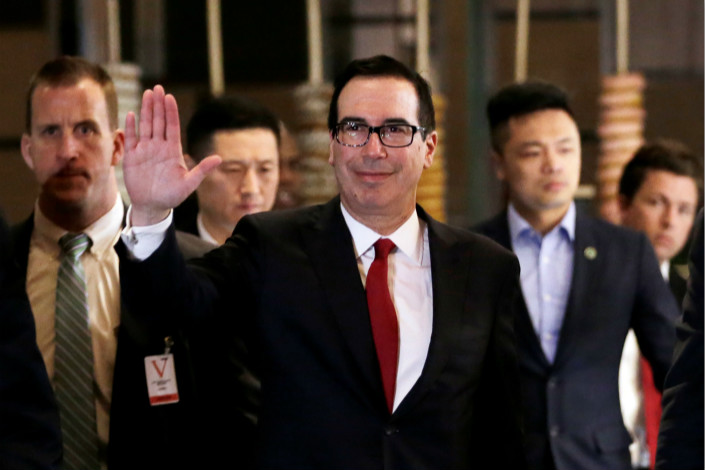Sino-U.S. Trade Talks End With Some Consensus, but Differences Remain

* Washington has demanded that China reduce its trade surplus with the U.S. by $200 billion
* Chinese state media says two sides still differ on some issues, though they reached a consensus on others
(Beijing) — Washington wants China to reduce its large trade surplus with the U.S. by more than half over the next two years, foreign media reported, as official Chinese media said after the final day of talks in Beijing that the two sides still differed on some issues although they had reached a consensus on others.
Washington has given China a list of demands, including cutting its trade surplus with the U.S. by $200 billion by the end of 2020, The Wall Street Journal reported Friday, citing a document sent to Beijing before the talks, which ended on Friday. The newspaper quoted Chinese officials as saying the U.S. proposals were “unfair.”
News of the demands emerged on the second and final day of talks between high-level delegations from the two sides, including U.S. Treasury Secretary Steve Mnuchin and Chinese Vice Premier Liu He, President Xi Jinping’s top economic adviser.
U.S. President Donald Trump has constantly pressured China to reduce its trade surplus with the U.S. since he came into power. China held a $375.7 billion trade surplus in goods and a $38.5 billion trade deficit in services with the U.S. in 2017, according to data from the U.S. Bureau of Economic Analysis.
Beside trade imbalance, Trump has also accused Chinese companies of stealing intellectual property from their American counterparts and forcing technology transfers.
The two sides exchanged views on a range of issues, including the expansion of U.S. exports to China, bilateral services trade, bilateral investment, protection of intellectual property rights, and tariff and nontariff measures, the official Xinhua News Agency reported Friday, without elaborating. The two sides have agreed to maintain close communication on relevant issues, Xinhua said.
The U.S. should show sincerity in trade negotiations rather than listing exorbitant demands, Xinhua said Wednesday in a commentary (link in Chinese).
“The chances of a breakthrough trade deal are seen as highly unlikely,” but the meeting could be a positive step for the two countries to avoid a trade war, and continual negotiations could ease tensions, said Lukman Otunuga, an analyst with foreign-exchange broker ForexTime, in a research note.
Economic and trade tensions between the world’s two largest economies have repeatedly escalated in recent weeks, with both sides exchanging tit-for-tat tariff measures and threats.
Contact reporter Lin Jinbing (jinbinglin@caixin.com)

- 1Cover Story: China Carves Out a Narrow Path for Offshore Asset Tokenization
- 2Drownings Shake Chinese Enthusiasm for Travel to Russia
- 3China Business Uncovered Podcast: A $15 Billion Bitcoin Seizure and the Fall of a Cybercrime Kingpin
- 4Over Half of China’s Provinces Cut Revenue Targets
- 5Li Ka-Shing’s Port Empire Hit by Forced Takeover Amid Panama Legal Dispute
- 1Power To The People: Pintec Serves A Booming Consumer Class
- 2Largest hotel group in Europe accepts UnionPay
- 3UnionPay mobile QuickPass debuts in Hong Kong
- 4UnionPay International launches premium catering privilege U Dining Collection
- 5UnionPay International’s U Plan has covered over 1600 stores overseas






